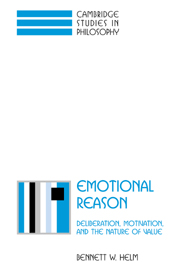Emotional Reason
How can we motivate ourselves to do what we think we ought? How can we deliberate about personal values and priorities? Bennett Helm rejects the standard philosophical answers to these questions, which presuppose a sharp distinction between cognition and impulse, and develops a detailed alternative theory both of emotions, desires, and evaluative judgments and of their rational interconnections. The result is an innovative theory of practical rationality and how we can control not only what we do but also what we value and who we are as persons.
- Rejects standard accounts of intentional mental states
- Proposes a theory of a rational structure underlying emotions, with consequences for our control over our own values
- Clearly and accessibly written
Reviews & endorsements
"This book is a significant contribution to some of the most central debates in moral psychology and represents an important advance in the articulation of a broadly McDowellian approach to them." Ethics
Product details
August 2007Paperback
9780521039116
272 pages
215 × 140 × 15 mm
0.355kg
Available
Table of Contents
- Acknowledgements
- 1. Two problems of practical reason
- Part I. Felt Evaluations:
- 2. Emotions and the cognitive-conative divide
- 3. Constituting import
- 4. Varieties of import: cares, values and preferences
- Part II. Practical Reason:
- 5. Single evaluative perspective
- 6. Rational control: freedom of the will and the heart
- 7. Deliberation about value
- 8. Persons, friendship and moral value
- Select bibliography
- Index.






